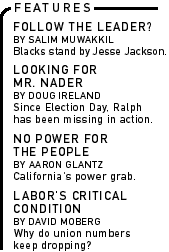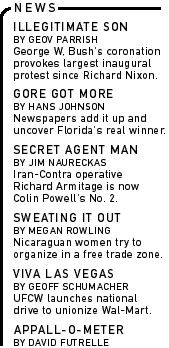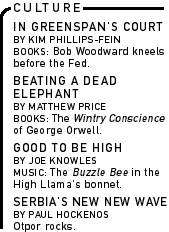

|

|

|

|
| |
|
|
|
Ironically, the first organized challenge to the George W. Bush's presidency is being spearheaded not by Ralph Nader, Jesse Jackson or another leader on the left, but by Republican John McCain, the Arizona senator and former Republican presidential candidate. Last month McCain visited Arkansas in the first leg of a barnstorming tour of key states to ignite grassroots support for the McCain-Feingold campaign finance reform bill. Earlier in January, the reform measure's future was brightened by Senate Majority Leader Trent Lott's pledge not to filibuster the McCain-Feingold legislation, as the Republicans have done previously, and to allow a two-week debate on the issue in March. This was not so much a goodwill gesture as a recognition that McCain and Russ Feingold (D-Wisconsin) were close to getting the 60 votes needed to stop a filibuster. McCain-Feingold bans unregulated soft money (unlimited contributions to political parties) and restricts the ability of independent issue groups to run television ads supporting or opposing a particular candidate. Many Republicans, including President George W. Bush, oppose the measure, viewing it as one step down the slippery slope of reform, which it is. Instead Bush and friends support a "reform" that bans soft money contributions from unions and corporations, but leaves soft money donations from rich individuals intact. This would hurt Democrats who depend on union dollars. In the last election cycle, the Democrats raised $243 million in soft money, and the Republicans took in $244 million. The campaign finance reform community has been divided on the bill. Some groups support pursuing partial reforms like McCain-Feingold. Others, such as Public Campaign, set as their goal public funding of campaigns, as is currently mandated in Vermont, Maine, Massachusetts and Arizona. The two goals are not mutually exclusive. "We see this as an important incremental step toward full public financing," says Steve Weissman of Public Citizen. "Any public financing program will be meaningless without a ban on soft money." Similarly, he says, public funding of campaigns will have little effect unless you also have bans on sham issue advertisements. Public Citizen is one of about 25 groups––including Common Cause, the American Association of Retired People and the Sierra Club––in Americans for Reform, a coalition effort that hopes to translate McCain's national tour into passage of the bill. McCain is firmly committed, motivated by both an intense dislike of Bush and a passionate belief that, as he has put it, the American political system "has become dominated by the special interests and the average American citizen is no longer represented." McCain showed up in Arkansas to put heat on Republican Sen. Tim Hutchinson, a McCain-Feingold fence-sitter who is up for re-election in 2002. On February 13, McCain will visit Illinois to put pressure on Republican Sen. Peter Fitzgerald. Other states on the tour include Sen. Gordon Smith's home state of Oregon and Sen. Bob Smith's New Hampshire. Both Republicans are up for re-election in 2002. Other stops may include Colorado and New Jersey. Common Cause is coordinating the campaign, since as a rule senators do not take kindly to their colleagues politicking against them in their own district. "This is the wrong way to put me in their camp. You don't enhance your chances of getting someone's vote by going in to organize a pressure campaign," Hutchinson told the Washington Post. Or at least no senator is going to admit that is how he gave you his vote. The strategy is sound, but its execution has proven difficult in
the past. In the early '80s, the anti-nuclear-weapons Freeze campaign
failed to translate its vast public support into ballot-box clout.
But should McCain-Feingold not pass, Americans for Reform will be
free to run independent issue advertisements that highlight the
dismal voting records of those senators who voted against campaign
finance reform.
|

